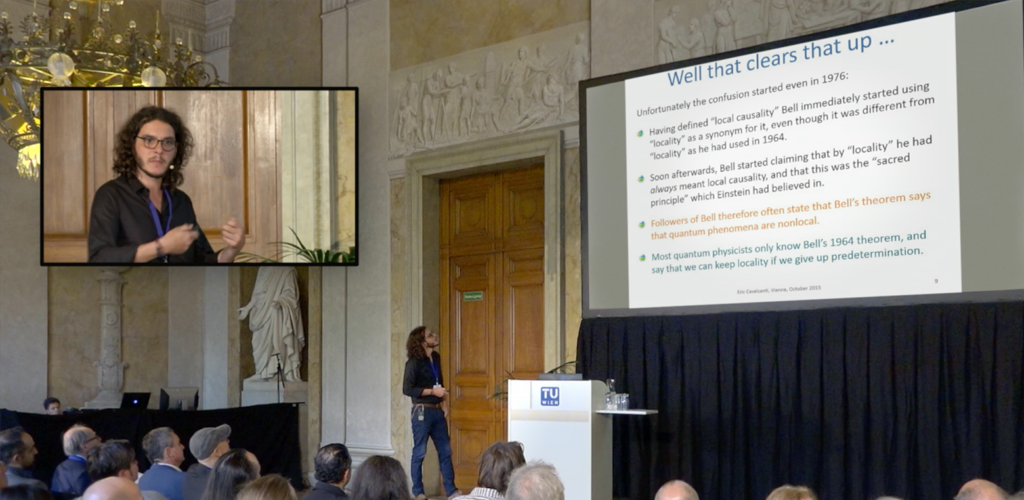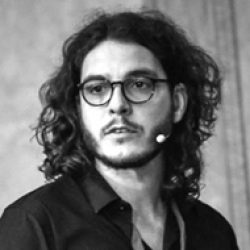
Links to videos of some of the talks I’ve delivered at various conferences and workshops over the years:
A Semantics for Counterfactuals in Quantum Causal Models
Date: April 27 2022
Conference: Quantum Physics and Statistical Causal Models, Simons Institute for the Theory of Computing, University of California, Berkeley.
The classical causal model framework of Pearl addresses a hierarchy of causal reasoning tasks — predictions, interventions and counterfactuals — of increasing complexity. Despite its wide range of applicability, the classical causal model formalism fails to accommodate quantum correlations while maintaining faithfulness to relativistic causality. A series of recent works in quantum causal models have produced formalisms that generalise various aspects of the classical framework, while allowing for a faithful description of quantum correlations. However, so far these have been restricted to addressing the first two rungs of Pearl’s causal ladder. In this talk I will introduce a formalism for counterfactual reasoning in quantum causal models, completing the quantum generalisation of Pearl’s causal hierarchy.
Can a quantum computer be your friend?
Date: April 26, 2021
On the relationship between No-Fine-Tuning and Bell-KS inequalities
Date: May 18 2021
In this talk I discuss conceptual aspects of the relationship between the assumption of no-fine-tuning applied to classical causal models and Bell-Kochen-Specker inequalities, following the results of [1,2,3].
[1] C. J. Wood and R. W. Spekkens, New Journal of Physics 17, 033002 (2015).
[2] E. G. Cavalcanti, Physical Review X 8, 021018 (2018).
[3] J. C. Pearl and E. G. Cavalcanti, arXiv:1909.05434 (2019).
Conference: The 4th workshop Quantum Contextuality in Quantum Mechanics and Beyond (QCQMB) (Online workshop, May 17-21 2021)
URL: https://www.youtube.com/watch?v=PBa0_GPrXV0
Implications of Wigner’s Friend Paradox for Quantum Causality
Date: 22/10/2020
Abstract: In this talk I present some of the implications of our no-go theorem on the Wigner’s friend paradox [Nature Physics, 2020] to the question of reformulating causality in a quantum world. In that work, we showed that if quantum evolution is controllable on the scale of an observer, then one of the following three assumptions must be false: “No-Superdeterminism”, “Locality”, or “Absoluteness of Observed Events” (i.e. that every observed event exists absolutely, not relatively). In this talk I discuss in more detail how that result has stronger implications than Bell’s theorem, by reformulating it terms of basic causal principles, following the terminology of [Wiseman and Cavalcanti, 2017].
In short, whereas Bell’s theorem can be resolved by replacing the quantitative part of Reichenbach’s Principle of Common Cause with a quantum generalisation, the Local Friendliness theorem cannot be resolved this way, since it does not assume that classical notion of causality. I argue that the resolution that is most in line with Leibniz-Einstein methodological principle — a philosophical underpinning for the research program of quantum causal models and the theory of relativity — is to reject Absoluteness of Observed Events.
Conference: Harvard Foundations of Physics Mini-Workshop on Causation (Online workshop, 22/10/2020)
URL: https://www.youtube.com/watch?v=4KKZzqTmqBE
Testing the reality of Wigner’s friend’s experience
Date: 23/07/2019
Abstract: Does quantum theory apply at all scales, including that of observers? A resurgence of interest in the long-standing Wigner’s friend paradox has shed new light on this fundamental question. Here—building on a scenario with two separated but entangled “friends” introduced by Brukner—we rigorously prove that if quantum evolution is controllable on the scale of an observer, then one of the following three assumptions must be false: “No-Superdeterminism”, “Locality”, or “Absoluteness of Observed Events” (i.e. that every observed event exists absolutely, not relatively). We show that although the violation of Bell-type inequalities in such scenarios is not in general sufficient to demonstrate the contradiction between those assumptions, new inequalities can be derived, in a theory-independent manner, which are violated by quantum correlations. We demonstrate this in a proof-of-principle experiment where a photon’s path is deemed an observer. We discuss how this new theorem places strictly stronger constraints on quantum reality than Bell’s theorem.
(Note: the talk uses terminology from the first arXiv version of this work. In the latest version, “Observer-independent facts” was replaced by “Absoluteness of Observed Events”, to distinguish it from the stronger assumption used by Brukner. This is also the terminology used in the final published version, to appear in Nature Physics.)
Conference: FQXi 2019 international conference: Mind Matters: Intelligence and Agency in the Physical World (Castelvecchio Pascoli, Italy, July 20-25 2019 )
URL: https://www.youtube.com/watch?v=FVlBLAvMK9A
Nonlocality and contextuality as fine-tuning
Date: 25/07/2017
Abstract: Nonlocality and contextuality are at the root of conceptual puzzles in quantum mechanics, and are key resources for quantum advantage in information-processing tasks. Bell nonlocality is best understood as the incompatibility between quantum correlations and the classical theory of causality, applied to relativistic causal structure. Contextuality, on the other hand, is on a more controversial foundation. In this work, I provide a common conceptual ground between nonlocality and contextuality as violations of classical causality. First, I show that Bell inequalities can be derived solely from the assumptions of no-signalling and no-fine-tuning of the causal model. This removes two extra assumptions from a recent result from Wood and Spekkens, and remarkably, does not require any assumption related to independence of measurement settings — unlike all other derivations of Bell inequalities. I then introduce a formalism to represent contextuality scenarios within causal models and show that all classical causal models for violations of a Kochen-Specker inequality require fine-tuning. Thus the quantum violation of classical causality goes beyond the case of space-like separated systems, and manifests already in scenarios involving single systems.
Conference: Contextuality: Conceptual Issues, Operational Signatures, and Applications (Perimeter Institute for Theoretical Physics, Waterloo, Canada)
URL: http://pirsa.org/17070039/
Experimental Metaphysics Beyond Bell’s Theorem
28/04/2017 (talk delivered via Skype–apologies for the sound quality)
Conference: Boston Colloquium for Philosophy of Science: Experimental Metaphysics 30 years On (Boston, United States)
URL: https://www.youtube.com/watch?v=5n9y2I8SiIs
Causal models for contextuality scenarios require fine-tuning
Date: 22/11/2016
Conference: Quantum Networks workshop (International Institute of Physics, Natal, Brazil)
The Two Bell’s Theorems of John Bell and Causal Emergence
Date: 23/10/2015
Abstract: In light of a recent reformulation of Bell’s theorem from causal principles by Howard Wiseman and the author, I argue that the conflict between quantum theory and relativity brought up by Bell’s work can be softened by a revision of our classical notions of causation. I review some recent proposals for a quantum theory of causation that make great strides towards that end, but highlight a property that is shared by all those theories that would not have satisfied Bell’s realist inclinations. They require (implicitly or explicitly) agent-centric notions such as “controllables” and “uncontrollables”, or “observed” and “unobserved”. Thus they relieve the tensions around Bell’s theorem by highlighting an issue more often associated with another deep conceptual issue in quantum theory: the measurement problem. Rather than rejecting those terms, however, I argue that we should understand why they seem to be, at least at face-value, needed in order to reach compatibility between quantum theory and relativity. This seems to suggest that causation, and thus causal structure, are emergent phenomena, and lends support to the idea that a resolution of the conflict between quantum theory and relativity necessitates a solution to the measurement problem.
Conference: EMQM15: Emergent Quantum Mechanics (Vienna, Austria)
URL: http://www.emqm15.org/presentations/speaker-presentations/videos/eric-calvacanti/
The preparation problem
Date: 03/12/2010
Abstract: The effects of closed timelike curves (CTCs) in quantum dynamics, and its consequences for information processing have recently become the subject of a heated debate. Deutsch introduced a formalism for treating CTCs in a quantum computational framework. He postulated a consistency condition on the chronology-violating systems which led to a nonlinear evolution on the systems that come to interact with the CTC. This has been shown to allow tasks which are impossible in ordinary linear quantum evolution, such as computational speed-ups over (linear) quantum computers, and perfectly distinguishing non-orthogonal quantum states. Bennett and co-authors have argued, on the other hand, that nonlinear evolution allows no such exotic effects. They argued that all proofs of exotic effects due to nonlinear evolutions suffer from a fallacy they called the ” linearity trap”. Here we review the argument of Bennett and co-authors and show that there is no inconsistency in assuming linearity at the level of a classical ensemble, even at the presence of nonlinear quantum evolution. In fact, this is required for the very existence of empirically verifiable nonlinear evolution. The arguments for exotic quantum effects are thus seen to be based on the necessity for a fundamental distinction between proper and improper mixtures in the presence of nonlinear evolutions. We show how this leads to an operationally well-defined version of the measurement problem that we call the “preparation problem”.
Conference: Perimeter Institute-Australia Foundations (PIAF) Workshop (Brisbane,Australia)
URL: http://pirsa.org/10120069/
Newcomb’s problem in the light of Bell’s theorem
Date: 30/09/2008
Abstract: In recent years there has been a growing awareness that studies on quantum foundations have close relationships with other fields such as probability and information theory. In this talk I give another example of how such interdisciplinary work can be fruitful, by applying some of the lessons from quantum mechanics, in particular from Bell’s theorem, to a debate on the philosophical foundations of decision theory. I argue that the basic assumptions of the popular causal decision theory — which was developed partly in response to a puzzle proposed by the physicist William Newcomb and published by the philosopher Robert Nozick — are analogous to the basic assumptions of a local hidden-variables theory in the context of Bell’s theorem. Both have too strong a prejudice about the causal structure of the world: there are possible games the world can pose such that an agent who operates by those theories is constrained to choose losing strategies no matter what evidence he or she acquires.
Conference: The Clock and the Quantum: Time and Quantum Foundations (Perimeter Institute for Theoretical Physics, Waterloo, Canada)
